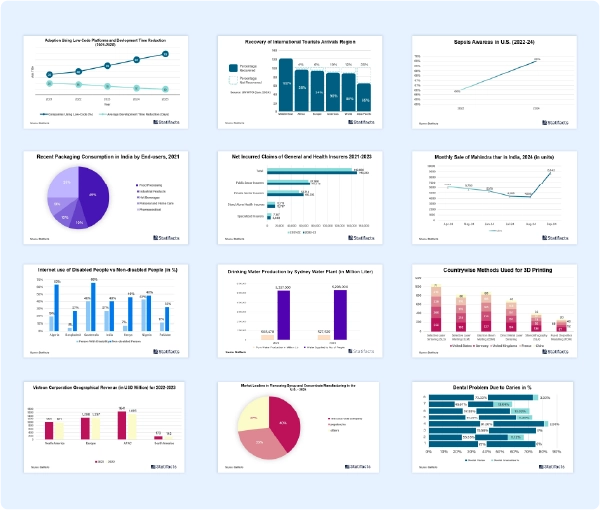The U.S. healthcare staffing market size is calculated at USD 19,490 million in 2024 and is predicted to attain around USD 33,860 million by 2034, expanding at a CAGR of 5.68% from 2025 to 2034.
U.S. Healthcare Staffing Market Report Highlights
- The travel nurse staffing service type segment dominated the U.S. healthcare staffing market share of 45.15% in 2024.
- The locum tenens service type is expected to grow at the fastest rate during the forecast period.
- The hospital end-use segment dominated the U.S. healthcare staffing market with the highest revenue share in 2024.
- The clinic end-use segment is expected to have a significant growth rate during the forecast period.
The U.S. healthcare staffing market refers to the production, distribution, and application of healthcare staffing, which is the process of hiring healthcare providers or healthcare professionals for a specific organization as needed. The service providers help healthcare organizations avail staff without indulging in a long recruitment process. Healthcare staffing refers to the process of hiring and managing medical professionals to provide patient care in a variety of healthcare settings. Healthcare staffing benefits include revenue cycle staffing, professional liability insurance, flexibility, ensure workforce flexibility, certification reimbursement, a superior hiring experience, referral bonus, reduced administration burden, paid time off, optimal patient care, competitive compensation, access to more qualified candidates, direct deposit, vision insurance, life insurance, disability insurance, medical, and dental insurance.
Increased adoption of outsourcing healthcare staff driving the growth of the U.S. healthcare staffing market. In the long run, outsourcing in healthcare helps in cutting down on overhead costs like administrative team maintenance and office space, among other operational expenses. Healthcare IT outsourcing has risen as a premier option for support offering optimal benefits with minimal management. Outsourcing in healthcare services has been a tactic to enhance efficiency, reduce expenses, and simplify operations. Outsourcing to a specialist in specific areas can dramatically enhance patient experiences, patient care, and patient outcomes. The benefits of outsourcing include offshore outsourcing issues, greater competitive advantage, increased reach, controlled costs, increased efficiency, and enhanced focus on core business activities.
Significant increase in the senior population that contributes to the growth of the U.S. healthcare staffing market. Healthcare is important for senior citizens. The most common medical issues the elderly people experience include kidney infections, joint pains, arthritis, cancer malignancy, diabetes, high blood pressure, and heart failure issues and they need more care. One of the most significant sources of job satisfaction in aged care is the knowledge that you are making a tangible difference in people’s lives. Caregivers provide essential support and companionship to elderly individuals who may have limited mobility or health issues. They deserve to be comfortable and elderly care will give them that. Whether they need medication reminders, help bathing and grooming, or another service from a caregiver, they are getting the physical and emotional comfort they need in this stage of their life. The importance of high-quality staffing in senior care includes competitive pay, along with advantages like health insurance and retirement plans, and can significantly reduce turnover rates.
Persistent shortages of nurses and healthcare professionals driving the growth of the U.S. healthcare staffing market. Healthcare staffing helps and tackles nurse’s shortage. The role of nurse staffing services in addressing shortages includes outsourcing healthcare staffing companies to supply temporary or permanent nursing staff to bridge the shortfall in healthcare institutions. This service maintains an ideal staffing ratio in healthcare. They easily arrange for nursing staff to be sent to healthcare institutions, which may be grappling with staff inefficiency because increase in the number of patients. This adoption ensures a constant care flow in healthcare institutions and keeps any disruptions in services in check.
Rising demand for temporary staffing for medical professionals contributes to the growth of the U.S. healthcare staffing market. Temporary staffing reduces these financial burdens while maintaining high-quality care. It helps to reduce costs, access a pre-vetted pool of skilled nurses without lengthy hiring processes, no full-time benefits required, and pay only for hours worked. Benefits of temporary employment in the healthcare industry include rapid response to emerging needs, enhanced skill sets and expertise, cost-effectiveness for healthcare facilities, filling gaps in healthcare coverage, and flexibility and work-life balance.
Artificial intelligence (AI) integration in healthcare staffing driving the growth of the U.S. healthcare staffing market. AI can isolate and automate these tasks, including preauthorizing insurance, following up on unpaid bills, and maintaining patient records. This eases the workload

